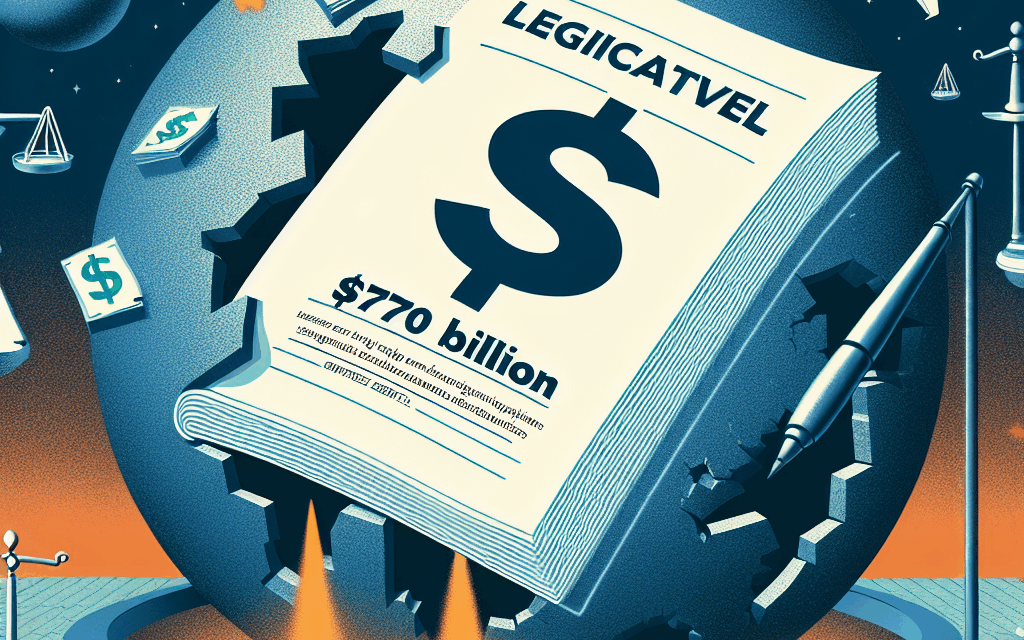GOP Megabill Could Cost Providers $770 Billion in Revenue
The GOP Megabill, a sweeping piece of legislation proposed by Republican lawmakers, has sparked intense debate across the healthcare landscape. With an estimated potential to cost healthcare providers around $770 billion in revenue, the implications of this bill are profound. This article delves into the various facets of the GOP Megabill, exploring its potential impact on healthcare providers, patients, and the overall healthcare system in the United States.
Understanding the GOP Megabill
The GOP Megabill is a comprehensive legislative proposal that aims to overhaul various aspects of the healthcare system. It encompasses a range of provisions, including changes to Medicare and Medicaid, adjustments to drug pricing, and modifications to insurance regulations. The bill is designed to reduce government spending on healthcare while promoting private sector solutions.
One of the most significant aspects of the Megabill is its focus on reducing reimbursements to healthcare providers. This reduction is projected to lead to a staggering loss of revenue for hospitals, physicians, and other healthcare entities. Understanding the implications of these changes is crucial for stakeholders across the healthcare spectrum.
1. Financial Implications for Healthcare Providers
The financial ramifications of the GOP Megabill are perhaps the most pressing concern for healthcare providers. With an estimated $770 billion in lost revenue, many providers are left wondering how they will sustain their operations and continue to deliver quality care.
- Reduction in Reimbursements: The bill proposes significant cuts to Medicare and Medicaid reimbursements. For instance, hospitals that rely heavily on these programs may face severe financial strain. According to the American Hospital Association, a 10% reduction in Medicare payments could lead to a loss of billions in revenue for hospitals nationwide.
- Impact on Rural Healthcare: Rural hospitals, which often operate on thin margins, could be disproportionately affected. Many rural facilities already struggle to remain viable, and further cuts could lead to closures, exacerbating healthcare access issues in underserved areas.
- Increased Financial Burden on Patients: As providers face revenue losses, they may be forced to shift costs onto patients. This could manifest in higher out-of-pocket expenses, increased insurance premiums, and reduced access to necessary services.
- Potential Layoffs and Job Losses: To cope with reduced revenue, healthcare organizations may resort to layoffs or hiring freezes. This not only affects healthcare workers but also impacts patient care quality and access.
- Long-term Sustainability Concerns: The long-term viability of many healthcare providers is at risk. If the Megabill is enacted, providers may struggle to invest in new technologies, staff training, and facility upgrades, ultimately affecting patient outcomes.
In summary, the financial implications of the GOP Megabill for healthcare providers are dire. The proposed cuts to reimbursements could lead to widespread revenue losses, threatening the sustainability of many healthcare organizations and ultimately impacting patient care.
2. Impact on Patient Care and Access
As healthcare providers grapple with the financial fallout from the GOP Megabill, the implications for patient care and access cannot be overlooked. The potential for reduced funding and increased costs could create significant barriers for patients seeking care.
- Access to Services: With potential closures of hospitals and clinics, particularly in rural areas, patients may find it increasingly difficult to access necessary services. This could lead to longer travel times for care and increased wait times for appointments.
- Quality of Care: Financial strain on healthcare providers may result in reduced staffing levels and resources, ultimately affecting the quality of care patients receive. Studies have shown that lower nurse-to-patient ratios can lead to worse patient outcomes.
- Increased Out-of-Pocket Costs: As providers seek to offset revenue losses, patients may face higher out-of-pocket costs for services. This could deter individuals from seeking care, leading to untreated health conditions and worsening health outcomes.
- Impact on Preventive Care: Preventive services, which are crucial for early detection and management of health issues, may be deprioritized as providers focus on maintaining financial stability. This could lead to an increase in chronic diseases and higher long-term healthcare costs.
- Health Disparities: Vulnerable populations, including low-income individuals and minorities, may be disproportionately affected by the changes proposed in the Megabill. Reduced access to care can exacerbate existing health disparities, leading to poorer health outcomes for these groups.
In conclusion, the potential impact of the GOP Megabill on patient care and access is concerning. As healthcare providers face financial challenges, patients may experience reduced access to services, increased costs, and a decline in the quality of care.
3. The Role of Drug Pricing Reforms
One of the key components of the GOP Megabill is its approach to drug pricing reforms. While the intention is to lower costs for consumers, the implications for pharmaceutical companies and healthcare providers are complex and multifaceted.
- Price Negotiation Provisions: The Megabill includes provisions that would allow the government to negotiate drug prices for certain medications. While this could lead to lower prices for consumers, it may also result in reduced revenues for pharmaceutical companies, which could impact their ability to invest in research and development.
- Impact on Innovation: Critics argue that price controls could stifle innovation in the pharmaceutical industry. If companies are unable to recoup their investments in new drug development, they may be less likely to pursue groundbreaking treatments, ultimately affecting patient care.
- Potential Shortages: If drug prices are significantly reduced, manufacturers may choose to limit production of certain medications, leading to potential shortages. This could create challenges for healthcare providers in ensuring that patients have access to necessary treatments.
- Effects on Specialty Drugs: Specialty drugs, which often come with high price tags, may be particularly affected by the proposed reforms. Providers who rely on these medications for treating complex conditions may face challenges in securing adequate supplies.
- Long-term Cost Implications: While the immediate goal of drug pricing reforms is to lower costs for consumers, the long-term implications for the healthcare system must be considered. If pharmaceutical companies reduce their investments in new therapies, the overall cost of healthcare could rise as untreated conditions lead to more expensive interventions down the line.
In summary, the drug pricing reforms included in the GOP Megabill present a double-edged sword. While they aim to reduce costs for consumers, the potential consequences for pharmaceutical innovation and access to medications must be carefully considered.
4. Political Landscape and Stakeholder Reactions
The GOP Megabill has generated a wide range of reactions from various stakeholders in the healthcare sector. Understanding the political landscape surrounding this legislation is essential for grasping its potential impact.
- Support from Conservative Lawmakers: Many Republican lawmakers support the Megabill as a means to reduce government spending and promote free-market solutions in healthcare. They argue that the bill will lead to greater efficiency and innovation in the sector.
- Opposition from Healthcare Advocates: Healthcare advocates and organizations, including the American Medical Association and the American Hospital Association, have voiced strong opposition to the bill. They argue that the proposed cuts to reimbursements will jeopardize patient care and access.
- Public Opinion: Public sentiment regarding the GOP Megabill is mixed. While some individuals support efforts to reduce healthcare costs, many are concerned about the potential consequences for access to care and the quality of services.
- Impact on Future Elections: The Megabill could have significant implications for upcoming elections. Lawmakers who support the bill may face backlash from constituents who are concerned about its impact on healthcare access and quality.
- Potential for Compromise: As the bill moves through the legislative process, there may be opportunities for compromise. Bipartisan discussions could lead to modifications that address some of the concerns raised by opponents while still achieving cost-saving goals.
In conclusion, the political landscape surrounding the GOP Megabill is complex and dynamic. Stakeholder reactions vary widely, and the potential implications for future elections and legislative negotiations are significant.
5. Future of Healthcare Policy in the U.S.
The GOP Megabill represents a pivotal moment in the ongoing evolution of healthcare policy in the United States. As lawmakers grapple with the challenges of rising costs and access issues, the future of healthcare will be shaped by the decisions made in the coming months.
- Shift Towards Value-Based Care: The Megabill may accelerate the shift towards value-based care models, which focus on improving patient outcomes while controlling costs. This could lead to innovative approaches to care delivery and reimbursement.
- Increased Role of Technology: As providers seek to adapt to changing reimbursement models, technology will play a crucial role. Telehealth, electronic health records, and data analytics will become increasingly important in delivering efficient and effective care.
- Focus on Social Determinants of Health: Future healthcare policy may place greater emphasis on addressing social determinants of health, recognizing that factors such as housing, education, and income play a significant role in health outcomes.
- Potential for Continued Polarization: The debate over healthcare policy is likely to remain polarized, with differing views on the role of government versus the private sector. This polarization could hinder efforts to achieve comprehensive reforms.
- Need for Comprehensive Solutions: Ultimately, the challenges facing the U.S. healthcare system require comprehensive solutions that address cost, access, and quality. Policymakers will need to engage in thoughtful dialogue and collaboration to create a sustainable healthcare future.
In summary, the future of healthcare policy in the U.S. is uncertain but ripe with potential for innovation and reform. The GOP Megabill serves as a catalyst for discussions about the direction of healthcare in the coming years.
Conclusion
The GOP Megabill has the potential to reshape the healthcare landscape in the United States, with significant implications for providers, patients, and the overall system. With an estimated $770 billion in lost revenue for healthcare providers, the financial ramifications are profound. As access to care and quality of services hang in the balance, stakeholders must engage in thoughtful discussions about the future of healthcare policy.
As we navigate this complex terrain, it is essential to consider the diverse perspectives of all stakeholders involved. The path forward will require collaboration, innovation, and a commitment to ensuring that all individuals have access to high-quality healthcare. The decisions made in response to the GOP Megabill will undoubtedly shape the future of healthcare in America for years to come.





